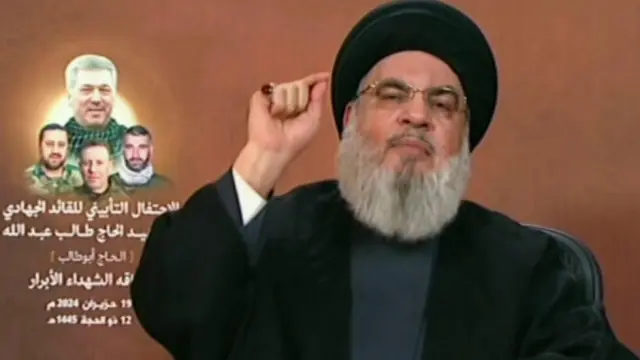In a dramatic escalation of rhetoric, Hezbollah’s leader Hassan Nasrallah has issued a chilling warning of potential widescale conflict with Israel, vowing unrestrained and unlimited warfare if hostilities were to intensify.
Nasrallah’s threat, reported by Reuters, came during a televised address where he emphasized that no part of Israel would be spared from Hezbollah’s attacks, signaling a potential expansion of targets to include areas in the Mediterranean.
The heightened tensions have been fueled by recent clashes along the Israeli-Lebanese border, coinciding with increased hostilities in Gaza following provocations by Hamas last October. Hezbollah, a Shiite group based in Lebanon, has framed its actions as solidarity with Palestinians in Gaza, deepening its involvement in regional conflicts.
Nasrallah’s remarks included an unprecedented warning directed towards Cyprus, suggesting that Hezbollah could consider the country “part of the war” if it continued to facilitate Israeli military operations by allowing the use of its airports and bases.
This marks the first time Hezbollah has overtly included Cyprus in its threats, underscoring the group’s readiness to broaden its scope of confrontation beyond immediate borders.
Reuters highlighted ongoing skirmishes between Israeli forces and Hezbollah along the volatile border, illustrating the precarious regional dynamics influenced by Hezbollah’s aggressive stance.
The situation remains fluid, with both sides exchanging sporadic fire and engaging in maneuvers that have raised concerns about a potential broader conflict engulfing the region.
Hezbollah, designated as a terrorist organization by several countries, including the United States and Israel, commands significant influence in Lebanon, where it operates as both a political and military force.
Nasrallah’s latest warning signals a departure from previous rhetoric, emphasizing a willingness to escalate conflict dynamics significantly.
The international community has expressed deep concern over the deteriorating situation, urging restraint and a return to dialogue to prevent further escalation.
The United Nations and other diplomatic channels have been actively engaged in efforts to de-escalate tensions and prevent a full-scale conflict that could have devastating consequences for the entire region.
As the situation continues to evolve rapidly, observers and analysts are closely monitoring developments along the Israeli-Lebanese border and assessing the broader implications of Hezbollah’s aggressive posture.
The possibility of further military engagements looms large, prompting regional stakeholders to brace for potential escalation while seeking avenues for diplomatic resolution.
This article was created using automation technology and was thoroughly edited and fact-checked by one of our editorial staff members

